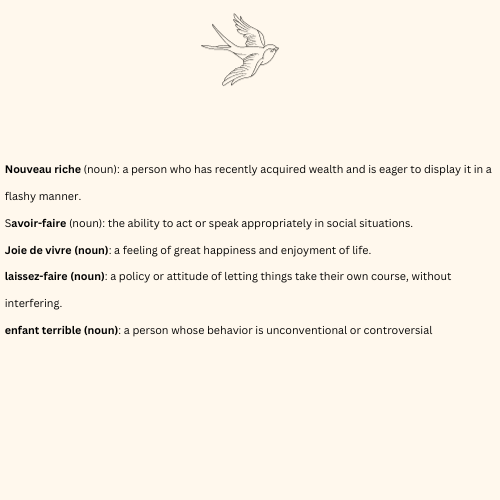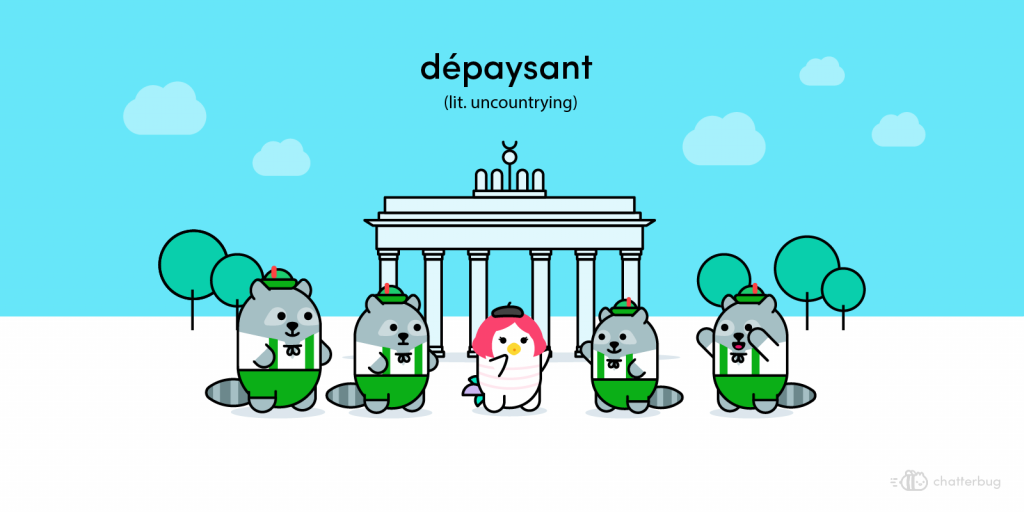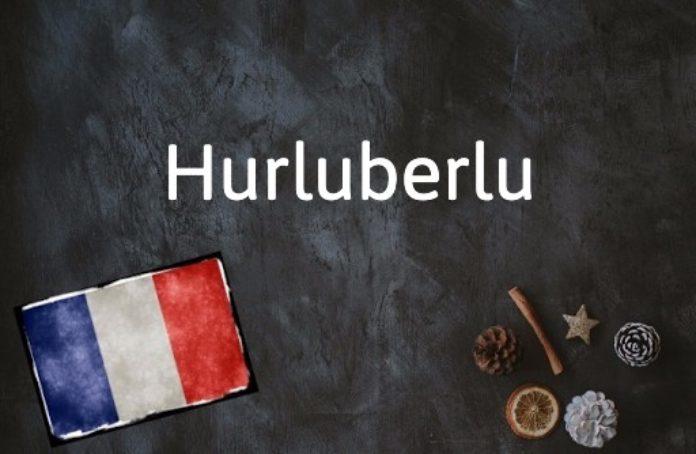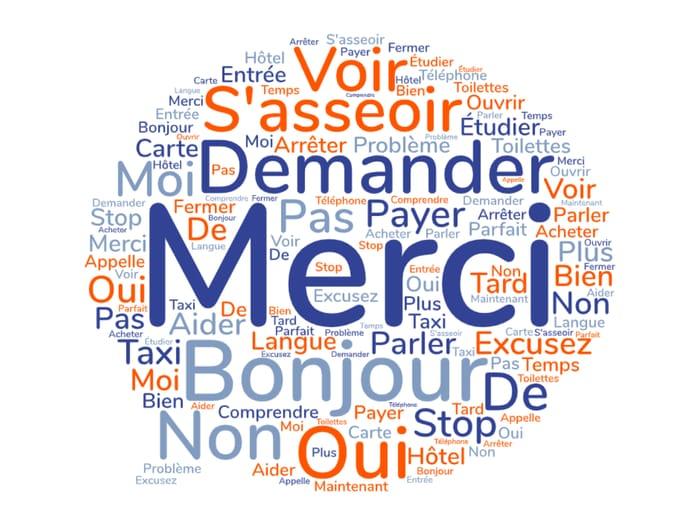It is still debatable among linguists whether our use of language affects the way we think or the other way around. Nevertheless, you look at it, French is one of those languages that simply has a lot of vocabulary that can be unfamiliar to someone who isn't a native speaker. Anyone with an interest in French will notice that several of these terms aren't the cognates their spellings might lead you to believe they are at first glance.
Advanced students might find it amusing to learn some of these words. Try incorporating them into casual discourse. When you start learning words to improve French vocabulary, remember that one of the easiest memorization tips is to find cognates. Cognates are French words that share a root with English words and look and sound similar in both languages.

Common French Words Used In English
- à la carte - a menu item that is priced separately, rather than as part of a set meal
- avant-garde - innovative or experimental, especially in the arts
- baguette - a long, thin loaf of bread
- boutique - a small, fashionable shop
- café - a small restaurant or coffee shop
- chauffeur - a driver of a private car or limousine
- chic - stylish and elegant
- croissant - a flaky, buttery pastry
- déjà vu - the feeling of having experienced something before
- faux pas - a social mistake or blunder
- rendezvous (noun): a meeting arranged in advance, especially between two people.
- entrée (noun): a dish served as the first course of a meal.
- fiancé (noun): a man who is engaged to be married.
- fiancée (noun): a woman who is engaged to be married.
- ballet (noun): a form of dance that tells a story through movement.
Rare French Words That Mean Beautiful
French is known for its words that describe beauty, if you are looking for romantic and rare French words for her or him (amoureuse/amoureux), then some of the most amusing French words are as follows:
- Attrayant (masculine adjective) - having an appealing or attractive quality
- Belle (feminine adjective) - possessing beauty or being beautiful
- Charmante (feminine adjective) - having a charming appearance
- Éblouissante (feminine adjective) - stunning or dazzling in a captivating way
- Étonnante (feminine adjective) - astonishing in a remarkable way
- Étourdissante (feminine adjective) - stunning in an overwhelming way
- Jolie (feminine adjective) - pretty or attractive in a delicate way
- Magnifique (feminine adjective) - magnificent or gorgeous in an impressive way
- Mignon (masculine adjective) - good-looking or cute in an endearing way
Rare French Words In English (With Meaning)
- Cachet (pronounced "ka-SHAY"): A distinctive mark or feature; a unique characteristic.
- Ingénue (pronounced "AN-zhuh-noo"): A naive or innocent young woman, especially in a work of fiction.
- Soirée (pronounced "SWAH-ray"): An evening party or social gathering.
- Vis-à-vis (pronounced "VEEZ-ah-VEE"): Opposite; face to face.
- Zeitgeist (pronounced "TSYTE-guyst"): The spirit or intellectual climate of a particular time or place.
- Parfait (pronounced "PAR-fay"): Perfect; excellent.

20 Unique French Words with Meanings
Caoutchouc
This seemingly unusual-looking word has a fairly clear origin and means "rubber," as in the bendy material we obtain from trees. The word "caoutchouc" is derived from the Quechua language of native South America. Given that both the German Kautschuk and the Spanish caucho share the same linguistic roots, English is the "odd one out" when it comes to this word.
Because of the flexibility of the French language, you can learn three new words from this, including the verb caoutchouter, which means "to coat with rubber," and the adjective caoutchoutifère, which means "rubber-producing." See if you can fit that descriptive term into another sentence even though it usually refers to trees.
Check out the 15 best love words in French.

Dépaysant
Dépaysant, directly translated, means “un-country-ing.” A strange word, to say the least, but one that expresses a sentiment similar to homesickness. It’s the feeling you get when you’re in a new place and experiencing very new things that make you feel foreign, out of sorts, and strange. Eating dinner at 9 p.m. in the south of France might be dépaysant, or giving new friends the bise (greeting them by kissing on the cheek).
Métro-boulot-dodo
Métro refers to public transportation, boulot to the slang term for a job, and dodo to baby talk for “sleep” (akin to “sleepytime” or “beddy-bye”). Combine them and you have a French compound noun that sums up the existential quandary of adult life: commute-job-sleep.
Flâner
This Baudelarian term is perfectly suited to French culture. Flâner is to wander with no particular destination in mind, people watching, window shopping and basically existing as a city-dweller. To Baudelaire’s mind, this sort of wandering was perfectly suited to a city like Paris, and he wrote many of his prose poems about doing just this—wandering.
Check out these motivational sayings in French.
Yaourter
Literally “to yogurt,” yaourter describes singing or speaking in a language one either doesn’t know very well or has decided to fake in whatever context they’re using it. Common usage refers to more of an imitation than a sincere attempt, like trying to fudge your way through a song you haven’t memorized the lyrics to or speaking a “pretend” language by mimicking the accent and vocal mannerisms without using real words. Another way to describe this phenomenon is with the expression chanter en yaourt (to sing through yogurt). Either term is often used to refer to a native French speaker singing along with English words with which they’re not entirely familiar.
Frappadingue
This fantastic, hybrid word is great for telling someone just how crazy they really are. Frappadingue comes from two separate words that both point toward someone’s insanity. Frappé- is the first part and comes from the verb frapper (to hit), as in, “You’re so nuts you must have been hit on the head.”
Loufoquerie
The French word loufoque originated from fou (standard French for “crazy”) in louchébem (a slang invented by French butchers in the 19th century). Louchébem involves moving the first consonant of a word to the end, tacking on a standard suffix, and adding the letter “L” to the beginning. This is still used in the French meat industry today.
Hurluberlu
The exact origins of this word are unknown, but it’s old enough to have been used in the 16th century by the French Renaissance writer François Rabelais. Hurluberlu can be used to describe an eccentric, scatterbrained person—like a crackpot or screwball. In other words, someone who might from time to time engage in some loufoquerie.
Check out the most moving quotes in French.
Tohu-bohu
This is a loan word taken from the Hebrew tohu wa-bohu, which appears in the original text of the Bible in the Book of Genesis, referring to the formless state of the universe before God created light, water, animals, people, etc. So practically the same word that was used to describe the origins of time can now be used to describe what happens when two car alarms go off simultaneously in a parking lot between a senior bingo game and a folk concert: confusion, pandemonium.

Râler
Râler describes a very particular way of complaining that has been all but perfected by the French. Somewhat more distinguished than whining, but not nearly as precise as complaining, râler is how the French express their perpetual dissatisfaction with the world. It is done with utmost grace, poise, and perfect grammar, bien sûr.
Œil-de-bœuf
You may be familiar with this word already since it has been adopted into English much in the same way as hors-d’œuvre. However, œil-de-bœuf is much less appetizing than hors-d’oeuvres!
This word literally translates to “ox eye.” Rather, œil-de-bœuf refers to an oculus, or a circular/oval window often part of the architecture of churches, mosques, and castles. In fact, the word œil (eye) can be used in French architectural vocabulary to refer to any small opening. This is logical though since the English term “oculus” is also simply borrowed from the Latin word for “eye.”
Chauve-souris
You may recognize the two composing parts of this word on their own: chauve means “bald” and souris means “mouse.” And what might a bald mouse be, you ask? Why it’s a bat, of course! There is a bit of debate among linguists as to how the so very strange chauve-souris came to replace the Latin term vespertilio. The most common theory is that folks used to call bats “owl mice” in popular Latin.
Cerf-volant
Like chauve-souris, there has been some debate about the origin of cerf-volant. It’s generally agreed that the term unfortunately has nothing to do with flying deer, but comes from a mistaken spelling of the Old French serp-volante, under the influence of Occitan—a language spoken in the south of France.
Crapoter
The French have actually invented a word for an amateur’s tendency to puff smoke without really getting a lungful. Crapoter is similar in spirit to yaourter, in that both words are used to refer to people who have chosen to pretend, or faire semblant. Perhaps these words reveal a particular disdain the French have for fakers, or perhaps they just reveal a French propensity for making stuff up.
Spleen
Another Baudelarian term, this word has nothing to do with the organ, which is called the rate in French. Spleen is a sentiment linked with profound feelings of dissatisfaction and discouragement.
Check out these beautiful phrases in French.
Saperlipopette
Saperlipopette falls into the category of expressions most people don’t say sincerely these days, or can’t even believe were ever said sincerely. You might have said this word if you stubbed your toe, were surprised by someone, or if you were just angry and needed to yell something non-vulgar. In fact, the word itself comes from a long line of deformations of another exclamation: sacredieu or sacrebleu. You didn’t want to get caught saying those words in a formal company, so they were disguised and euphemized until saperlipopette came to be.
Balles
Balles means bullets, but if you hear someone use this term in a market, weapons are probably not involved. That’s because it’s also a street term for euros. In the United States, it would be the equivalent of hearing “bucks.” If you want to sound really authentic, use balles when you’re emphatically complaining about how expensive something is!
Fute-fute
Meaning clever or bright, fute-fute is commonly used in the negative phrase pas fute-fute, to indicate that someone is not (as we might say in English) the brightest bulb in the box. A slang version of the adjective futé, meaning clever or cunning, fute-fute is especially lovable for its onamonapoetic evocation of a short circuit.
Check out the 30 best love quotes in French.
Prout
Prout is the onomatopoetic word for “toot” in French. Onomatopoetic words are often fun, but this one, in particular, seems to have a special charm, in any language!
Raplapla
Like ananas (pineapple), you might be unsure of when to stop spelling them. Just remember three vowels, then move along.
It would help if you tried to include as many of the lovely French terms you've discovered in your vocabulary as you can. One of the most crucial ways to learn a new language is to expand your vocabulary by employing these catchy words. Knowing these words can help you sound fantastic when speaking this Romance language, and they'll also be helpful in casual discussions.
To become fluent, keep in mind that you must hear, talk, write, and read in your target language.
Make your own flashcards using the French vocabulary words from the list above, tune in to French radio to learn some essential expressions, and watch instructional French videos to learn vocabulary and practice key grammar points. And of course, the next stage in honing your language abilities is working with a French tutor or enrolling in conversational French lessons.















